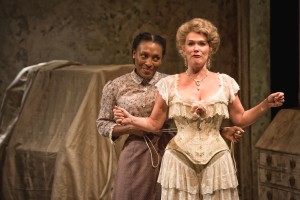Everyman Hosts INTIMATE APPAREL’s Triumphant Return to Baltimore
Theater Reviews Page | Previous Theater Review | Next Theater Review
Everyman Hosts INTIMATE APPAREL’s Triumphant Return to Baltimore
Posted on BroadwayWorld.com October 29, 2017
Lynn Nottage is a playwright of immense scope. She can write convincingly of the court of Louis XIV (Las Meninas), the war-torn 20th century Congo (Ruined), or turn-of-the-previous century New York (Intimate Apparel), which is currently being revived at Baltimore’s Everyman Theatre. The characters the audience will encounter in her plays are equally diverse: a dwarf court jester, African prostitutes and mercenary soldiers, an Orthodox Jewish cloth merchant (to name a few). But there seems to be a constant in these plays nonetheless: the reality that people of color and women do not get many breaks or many chances for happiness or fulfillment. Whatever they do achieve along these lines is both hard-won and partial.
In fact, that constant reality of limits on the available economic opportunity and on the available happiness is precisely the theme of Intimate Apparel. Heroine Esther (Dawn Ursula), being both black and female, looks for fulfillment in love, in friendship, and in work (as a seamstress and lingerie maker), and it seems at the end that she has obtained about all of any of these that is on offer. It may not be enough, but it remains Esther’s triumph that she has fully occupied the ecological niche of happiness that the oppressive world in which she finds herself affords her. In a kind of tableau vivant at the end, all of the characters who have played important roles in her life swirl around her, and it sinks in how in every case, regardless of whether the characters have been good to her, bad to her, or some of both, she has successfully exploited whatever each could have contributed to Esther’s development.
The swirlers include: Mrs. Van Buren, a socialite, friend and confidante (Beth Hylton) (pictured above with Ursula); Mrs. Dickson, Esther’s landlady at the outset of the action (Jenn Walker); Mr. Marks, the above-mentioned cloth salesman (Drew Kopas), who might be far more to Esther than a friend were it not for the Orthodox prohibition of exogamy; prostitute Mayme, a friend who may not be a perfect friend (Jade Wheeler); and George (Bueka Uwemedimo), Esther’s West Indies pen pal who would like to become Esther’s husband. Each of them, keenly realized by Nottage, provides Esther a very distinct set of opportunities and challenges. If Esther does not negotiate all of these relationships with unqualified success, much of that comes with the territory of being a minority woman in the dawning days of the previous century.
As is generally the case at Everyman, the direction (Tazewell Thompson) and the cast are superb. Notably, Ursula, seen two years ago at Everyman as Mama Nadi in Ruined, adds another memorable Nottage heroine to her resume, less openly emotional than Nadi and perhaps less traumatized (the Congo at war generally being a far more brutal place even than lower Manhattan), but in some ways more interesting for the understatement involved. Hylton, most recently seen as Heidi Holland in The Heidi Chronicles at The REP, squeezes every drop of humor from the role of a superficial and light-hearted socialite, given to lounging around in flattering unmentionables crafted by Esther. Much the same could be said of Wheeler’s wise-cracking hooker. And it seemed that every time Drew Kopas came onstage as Mr. Marks, who was in some ways the most understatedly tragic of the characters, the audience nevertheless leaned forward a little, such was the power of the writing and the acting of the role. Perhaps Uwemedimo’s thick Caribbean accent was a bit over the top (my companion reported great difficulties in understanding him at all), but I suspect that that was a directorial call.
Which is not to overlook the splendid costuming – pretty much required in a play so much about clothing. Designer David Burdick‘s hand was sure, from corsetry and boudoir wear to sharp male outerwear, not to mention an ornate smoking jacket that becomes as significant to the plot as Desdemona’s handkerchief. And I was always a little regretful when the largely ragtime piano cues stopped, presumably the handiwork of Piano Consultant Ernest Liotti.
To those who, like me, unfortunately missed the world premiere of this play, right here at Baltimore’s Center Stage back in 2003, and didn’t make it to New York to see the play up there in 2004, when it won the Outer Circle Critic’s Award for Best Play, this is a welcome opportunity to catch up. Don’t miss it again.
Copyright (c) Jack L. B. Gohn, except for production photograph. Photo credit: ClintonBPhotography
Theater Reviews Page | Previous Theater Review | Next Theater Review
